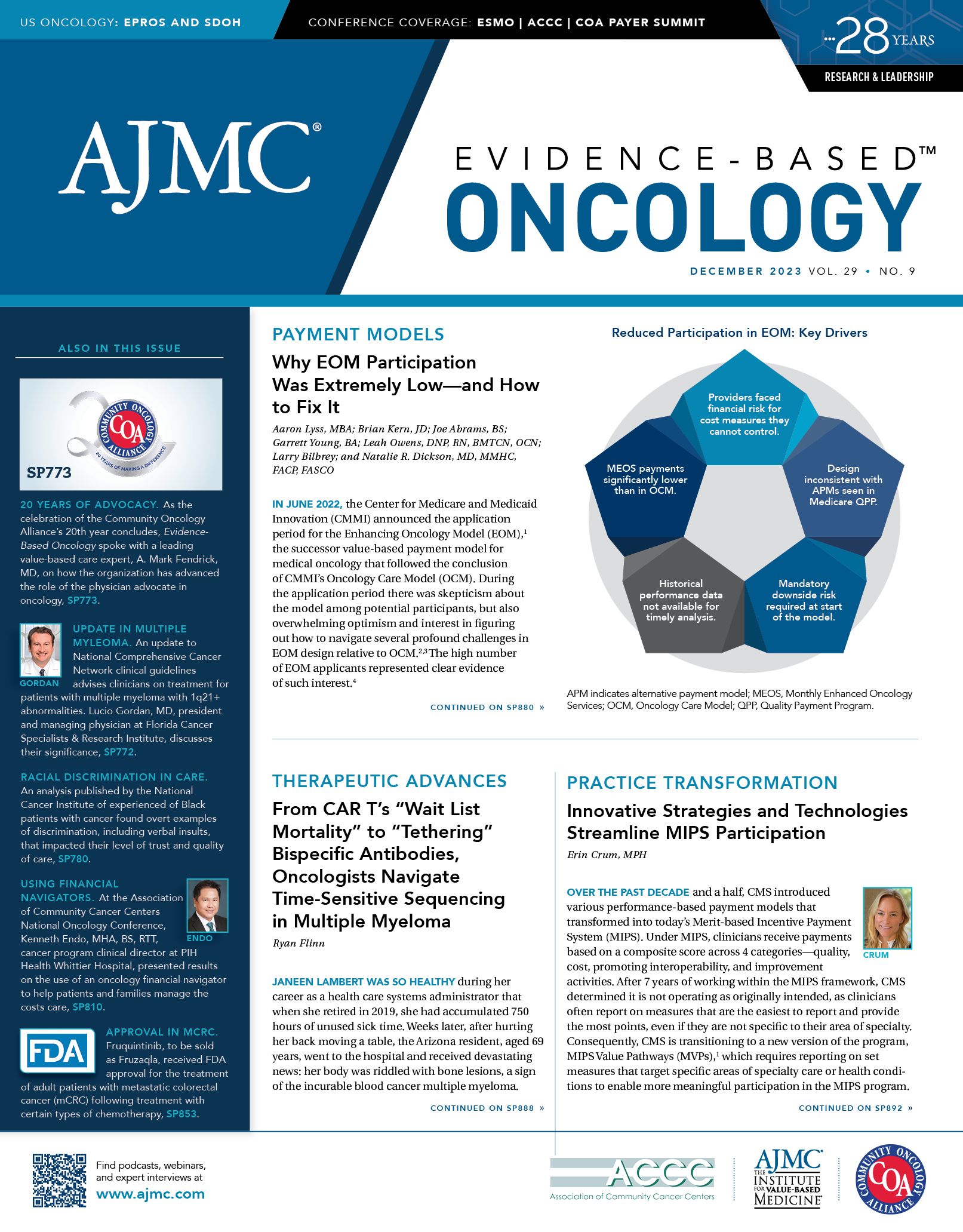- Center on Health Equity & Access
- Clinical
- Health Care Cost
- Health Care Delivery
- Insurance
- Policy
- Technology
- Value-Based Care
FROM THE EDITOR IN CHIEF: The Coming Challenges to Cancer Care—Complexity, Scalability, and Scarcity
I was privileged to attend the recent Patient-Centered Oncology Care® meeting, presented by The American Journal of Managed Care, during which stakeholders across the cancer care domain engaged in discussions about the challenges we will face over the next decade. These challenges fall roughly into 3 categories.
Alvarnas

Growing Diagnostic and Care Complexity
Patients with cancer are profoundly differentiated from most other patient populations. This puts intense pressure on financial and care systems that were developed based upon relatively static models and concepts that focus on unit cost. Our cancer classification systems and risk stratification models have grown in complexity, as has our portfolio of immuno-oncological and targeted treatments. Managing this while staying current with how best to deliver optimal care is a Herculean task that will strain clinicians and their teams.
From a payment standpoint, cancer care stands at odds with the population health model, which will increase the difficulty of creating fair and sustainable payment systems while controlling costs. There are no “average” patients with cancer; instead, these patients represent a highly differentiated population of biopsychosocial outliers whose uniqueness is key to their survival and well-being. Translating this into payment models will require a profound level of invention and reinvention.
Nonscalability Systems of Access to Care
As cost pressures across the United States increase, many payers have moved to control costs through the creation of narrow provider networks. Narrow networks are a part of many Medicare Advantage and Medicaid coverage systems. Although such networks may decrease non–value-added variability across groups of physicians in the primary and secondary care setting, it is impossible for these networks to replicate the capacities and resources that may be essential to safely deliver certain cancer care technologies, such as chimeric antigen receptor T-cell therapy, cellular therapeutics, and gene therapies. In addition, narrow care networks may also reduce access to specialty cancer surgery and relegate patients to care at low-volume surgical centers that result in worse patient outcomes. Narrow networks can only provide effective and equitable care for patients with cancer if they are constructed with scalability in mind—allowing patients to leave their networks to receive appropriate care.
The Unintended Consequences of Pressures to Reduce Care Costs
The shift from Medicare’s Oncology Care Model (OCM) to the Enhancing Oncology Model (EOM) came with increasing downward financial pressure upon participants. With significant cuts to the Monthly Enhanced Oncology Services (MEOS) payment and a requirement that clinicians take on financial risk from the beginning of model participation, physicians are being asked to do much more with less. The marked attrition rate in participating practices between the OCM and EOM may be such that the push toward cost containment has hit a breaking point.
Beyond the EOM, erosions in the conversion factor will also impact clinicians’ ability to deliver care in sustainable ways. Under the finalized 2024 Physician Fee Schedule rule, the conversion factor will fall to $32.74—a decrease of $1.15, or 3.4%, from 2023. It is worth considering that since the origination of the conversion factor in 1992 (original value $31), in real dollar terms, the conversion factor has been cut by 50%. If left unchecked, zero-sum game financial models will make cancer clinical practice unsustainable over time.
Conclusion
As we move into 2024, the solutions to these challenges will require continued collaboration among patients, physicians, payers, policy makers, pharma, and other stakeholders. The promise of new and better treatments should not be reserved for the few or the privileged. Equitable care and better patient outcomes are within reach if we embrace the ideal that cancer care is differentiated from other types of care; the path forward is predicated upon understanding and embracing that differentiation.

Quality of Life: The Pending Outcome in Idiopathic Pulmonary Fibrosis
February 6th 2026Because evidence gaps in idiopathic pulmonary fibrosis research hinder demonstration of antifibrotic therapies’ impact on patient quality of life (QOL), integrating validated health-related QOL measures into trials is urgently needed.
Read More
Building Trust: Public Priorities for Health Care AI Labeling
January 27th 2026A Michigan-based deliberative study found strong public support for patient-informed artificial intelligence (AI) labeling in health care, emphasizing transparency, privacy, equity, and safety to build trust.
Read More
Ambient AI Tool Adoption in US Hospitals and Associated Factors
January 27th 2026Nearly two-thirds of hospitals using Epic have adopted ambient artificial intelligence (AI), with higher uptake among larger, not-for-profit hospitals and those with higher workload and stronger financial performance.
Read More
Motivating and Enabling Factors Supporting Targeted Improvements to Hospital-SNF Transitions
January 26th 2026Skilled nursing facilities (SNFs) with a high volume of referred patients with Alzheimer disease and related dementias may work harder to manage care transitions with less availability of resources that enable high-quality handoffs.
Read More
